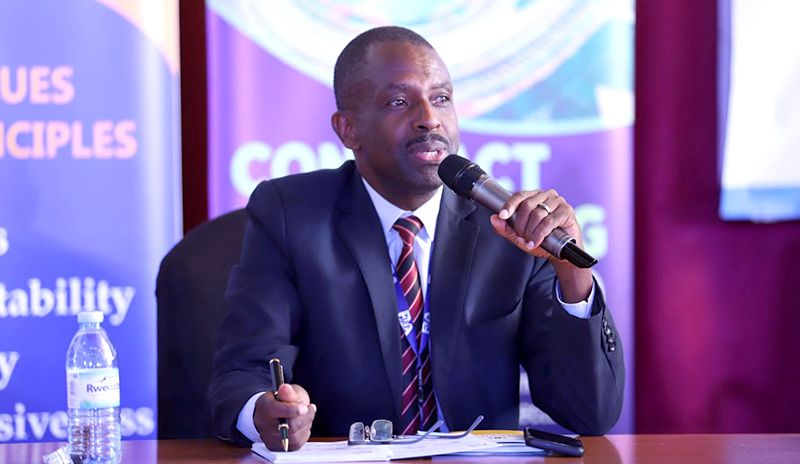

The United Nations Human Rights country representative for Uganda Robert Kotchani while addressing a news conference recently
The United Nations Human Rights office in Uganda is waiting for the government’s response to their proposals towards the improvement of the Computer Misuse Act that was recently sent to the President to be accented to.
The United Nations Human Rights country representative for Uganda Robert Kotchani recently warned that assenting to the Computer misuse act in its current form would amount to violation fundamental internationally accepted democratic standards including those that relate to access to information. Kotchani also said that the provisions would violate Uganda’s Constitution and specifically Article 41 that provides for freedom to access information in the hands of the state.
Article 41 gives every citizen a right of access to information in possession of the state or any organ of the state unless the release of that information is likely to affect the national security or interfere with the right to privacy of any other person.
Speaking at recent events to commemorate the International Day of universal access to information, Kotchani said there are sections in the recently passed Computer Misuse bill which must be closely examined before it is assented to by the President, if Ugandans are to enjoy their right to access information.
“We have joined hands with some partners including the UHRC we have made some comments and we are now on the advocacy stage so that we are pointing at and possibly consider our concerns before he assents the law….we are used to experiences where the president has read the law and advised to hold on until a number of adjustments are made, and we are hopeful this is going to be the case,” Kotchani
The chairperson Uganda Human Rights Commission, Mariam Wangadya noted that there is need for amendment of the old laws like the secrecy act that could be hampering the effective observation of the right of access to information.
Wangadya says some public servants may deny Ugandans information because they took the secrecy oath.
“Transparency and accountability requires that the public gets access to what we (public servants) are doing in our offices so to deny the public information is inconsistent with those values of transparency and accountability, we need to revisit certain laws so that those which unduly impede enjoyment of the right of access to information , those which are draconian, those which no long save the purpose of democracy and human rights should be nullified,” said Wangadya.
Further commenting on the computer misuse bill, Wangadya noted that whereas other laws should not be seen to contravene the constitution, the right to expression is not absolute and therefore there is need for regulation.
“The right to freedom of expression should be enabled, should not be impeded but like all other rights, it should be exercised responsibly, what I know is that laws are enacted to regulate excess conduct and in Uganda we have only four absolute rights and the right to freedom of expression is not one o f those, so it should be exercised responsibly,” Wangadya.
Considering the Twaweza research findings indicating that the majority of Ugandans trust information relayed through mainstream media, the Uganda Human Rights Commission called for deliberate efforts to support the media in Uganda to ensure that the population continues to access information.
Wangadya noted that the media needs government support to facilitate access of information to the public for effective service delivery and accountability.
She pointed out that courts of law should be sensitive when awarding costs and damages in cases involving the media. Wangadya says that exorbitant costs and damages slapped on media entities in cases such as defamation may lead to closure which may be detrimental to the entire population.
“When defamation suites are filed against media houses the damages awarded to the plaintiffs are getting higher and higher , and that with time this may have the unfortunate effect of silencing the media, am not here to say that people’s reputation should be ruined but courts should avoid warding high damages which have an effect off silencing the journalists or even close media houses which is inconsistent with the right to access information,” Wangadya said.














Solomon Lubambula
Leave a Comment
Your email address will not be published.